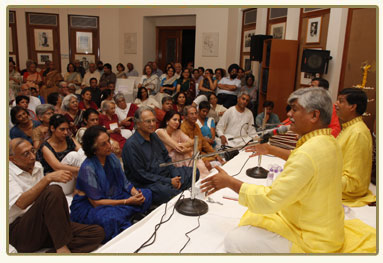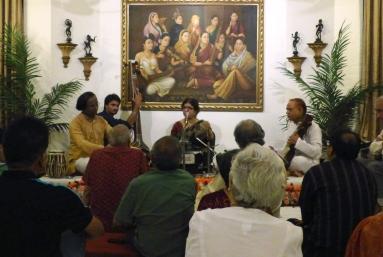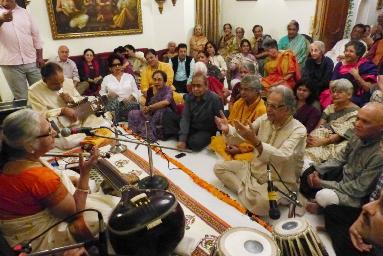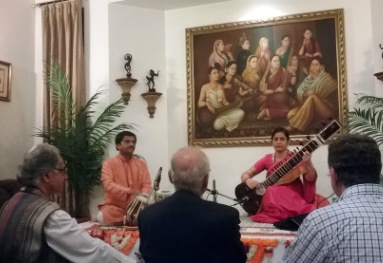
Buzz about the Baithak
- In March this year, in a dimly lit living room in a Gurgaon farmhouse, away from the cacophony of the city, a handful of people were seated on the floor. …. Girija Devi, a regular at the Baithaks organized by 81 – year old businessman Vinod Kapoor, knew exactly how to set the mehfil alight. Indian Express Eye, June 14, 2015
- "Not to miss May 4, 2015 issue of India Today magazine featuring VSK Baithak photograph taken years ago at Satya Sai Centre, Delhi."
- Delhi is known for its “international” life. Some of the best evenings you can have in the city are in people’s homes. Diliwallas are famed for their warm, generous hospitality. Couple this with a passion for music and you have the makings of a perfect evening – a traditional Indian music Baithak.
Entrepreneur Vinod S Kapur is one such music patron. He has been hosting the superstars of Hindustani classical singing for more than three decades. Hindustan Times Brunch, January 11, 2015
- Vidyadhar Vyas's concert at VSK Baithak was a masterful exposition
"Last Saturday, one had the chance to listen to his riveting performance at the VSK Baithak held in the
World Wildlife Fund auditorium. Accompanied by Vinod Lele on Tabla and Paromita Mukherjee on
harmonium." The Hindu, Friday Review February 14, 2014
- "There is spontaneous give and take – your appreciation and feedback is a big part of the music," says
businessman Vinod S Kapur whose dozen Baithaks a year draw a loyal, unswerving gathering of music
lovers who you will never see at big music melas. Sunday, Times of India, February 9, 2014
- "Perhaps the most treasured reward of the VSK Baithaks
is the deep sense of fulfilment and musical satisfaction it
provides to listeners by creating and inspiring ambience forte
invited artistes to give their best. In each baithak, the entire
evening is devoted to just one artiste with no time limit and is
granted full freedom to choose the ragas of choice." The
Hindu, December 12, 2008
- "The traditional format of listening to classical music
in the baithak style has been the principal source of
nourishment that kept our music alive over the centuries. The
VSK Baithaks are doing just that. The mutual give and take,
which is the essence of the, is produced firstly by physical
proximity of the performer and listeners and then by the
informality of the creative environment. This was once again
evident during the unforgettable sitar recital of Ustad Shujat
Khan this past week. …..it needs an inspiring atmosphere of
a VSK Baithak and artiste of the calibre of Shujaat Khan to play
only one raag for two and a half hours. Manjari Sinha, The
Hindu, January 20, 2006
- The VSK Baithak was established by VS Kapur of the Kegg Farms
first at his homes and then on a regular basis at the India
Habitat Centre. This effort has arisen put of Kapur's passionate
conviction that our classical music is all that is left which is
truly Indian in our fast degrading social system. In a society
where everything is borrowed from outside-from democracy,
election and the judiciary as indeed the whole drift of
life-there is little left that is Indian any more except this
stubborn tradition of our classical music which refuses to
disappear like the rest of our moral values. Countering the
principle that a second hand country produces second hand
people, the Baithak tries to bring out our first hand men and
women to tell us who we really are. This is the basis of the VSK
Baithak programme." Raghav R Menon
- At present I am seventy and in my forty five years pursuit of
musical art and close association with the stalwarts of
Hindustani music, I did not come in contact with a person who is
s addicted with the Baithak music i.e. Mehfil as yet except
yourself. Actually in baithak music we get the opportunity of
listening to the intricacies and fineries of our classical
music. Its most unfortunate phenomenon as much old and beautiful
tradition of music is almost on the verge of dying. So in true
sense persons like you are the saviours of our old and rich
traditions of music." Gajendra Narayan Singh, Writer,
Patna September 9, 2008
- " To hear him( Venkatesh Kumar, vocalist from Dharwar),
one had to do a bit of penance as his recital was held, so to
say, 'far from the madding crowd' somewhere in Gurgaon in an
environment, the most congenial in the world for music-making.
With V SK Baithak as the organiser, the venue of the recital was
Keggs Farms of Vinod Kapur. Suffice it to say that the place,
the kind of audience and the quality of music were enough of
compensation for the distance one had to cover. Once inside, you
felt, you had become the denizen, of a new world of peace,
tranquillity, meditation and music." Prakash Wadhera,
The Hindu, December 14, 2001
- One among the few regular music soirees being held at Delhi
in the intimate ambience of mehfil baithak forms is VSK's
monthly series at India Habitat Centre. It is heartening to
observe the large audience turnout. A number that is rising with
each show. It might be worthwhile for other organisers to obtain
a copy of VSK's mailing list and see if those music lovers could
be drawn towards concerts presented by them. However merely
mailing invitation cards is unlikely to attract the VSK
audience. It is the personal involvement and interaction with
artists and their audience by the Kapur husband-wife duo, Vinod
and Rani that keeps invites and the performance relaxed and
cheerful.
The VSK audience may not comprise many music lovers who could
be regarded as proficient in their knowledge of classical music.
Yet most appear to be true rasikas in the real sense. This is
evident from the manner in which they cheerfully remain glued to
seats (mostly on the floor), for four to five hours at a
stretch, breaking for refreshments.
The VSK's objective to promote and feature upcoming musicians
and seniors, who have not been given adequate exposure, is
indeed laudable." Jitendra Pratap
- "Borrowing a catchy phrase from the PVR Anupam
advertisement which claims the multiplex to be "the only
way to go to the movies", it can be said of the 'Baithak'
that 'it is the best way to listen to Indian classical music'.
The Hindu
- "Some of the mot cherished moments in music one
treasures in one's memory have come at such relatively small and
intimate gatherings held from time to time under the banner of
VSK Baithaks during the past three or four years. In them, after
intervals you taste what may be called quintessential music. For
the first couple of years these "baithaks" used to be
held in distant farm house somewhere in south Delhi and the
audience used to consist of music lovers from the neighbourhood,
mostly friends and acquaintances of Vinod Kapur, the guiding
spirit behind the "baithaks". To attend one of these-
a recital by Varanasi's Chhanu Lal Misra-I was picked up from my
residence in west Delhi. And what a generous shower of musical
bliss one experienced that day, what a deluge of heartfelt "wah
wah" greeted one's ears at every impassioned strain of
music, spurring the singer to delve into greater depths and
discover the unexplored regions of the melody! Ever since like a
fly involuntarily drawn to the honey pot, one has repaired to
these "baithaks" again and again to taste the same
brand of honey" Prakash Wadhera, The Hindu, August 4,
2000

Purab Ang Gayaki Kapur has featured all kinds of artistes at
his baithaks - both unknown and "marquee names" - but his
soft corner is reserved for the music known as Purab Ang Gayaki,
which we would better recognise as Thumri, Dadra and other lilting
songs that characterise the 'lighter' side of classical music. For
decades, the nomenclature debate has simmered: On the one hand,
artistes of this genre chafe at being called light singers; on the
other, the hardboiled classicists don't feel it merits the honour of
being considered 'pure' classical, like the Khayal and Dhrupad
genres. But everybody loves it. And for years, classical singers
would tag on a thumri or dadra or a chaiti or other such composition
- made famous by singers like Girija Devi, Naina Devi and Savita
Devi to name just three - after an hour or two of classical singing.
It was "used as a minor embellishment at the end, because it's
so sweet," says Kapur.
But Kapur prefers the term Purab Ang Gayaki since this genre is
associated with the banks of the Ganga in the East, primarily
Banaras. "I'd rather call it Purab Ang than light classical,"
he declares to those who aver that Thumri and Dadra belong to
gharanas (schools) other than Banaras - for example, the Patiala
gharana. Naming the genre is not just quibbling with geography
"It's more than music," says Kapur. It is "representative
of a way of life" and of the Ganga-Jamuni tehzeeb of the
subcontinent. "It is a very important cultural legacy."
It all started for Kapur when as a young man over four decades ago
he heard Girija Devi singing at an open-air event near Bareilly.
Smitten, he plucked up the courage to ask her to perform for him and
his colleagues in Bareilly, and she obliged, singing into the night.
The experience left an indelible impact and converted him to the
charms of chamber music forever.
Now, he has begun an ambitious project to encourage Purab Ang gayaki
throughout the country by instituting the Purab Ang Utsav and three
categories of recognition named after Girija Devi, who, along with a
number of other eminent artistes, is backing him to the hilt. This
past week he organised the first leg of the festival at IHC. The
festival now moves to Varanasi and Kolkata. "I personally took
on myself to contact people all over the country," narrates the
tireless Kapur. "I spoke to them on the phone. They are in all
nooks and corners. We had about 60-70 people who sent in their
recordings. We can't possibly listen to them all this year.
Thirty-six will perform this year. None will perform in his or her
vicinity. You stir it up, you churn it up!" The selected
artistes are disciples of well known singers like Girija Devi
herself, besides Shobha Gurtu, Shubhra Guha and others. "They
are from diverse shades," says Kapur.
If you missed the Delhi opening of the festival, there is still more
to look forward to. Out of the 36 performing in the three cities, 12
will be shortlisted and the festival returns to the Capital
April-end. An eminent panel will select three winners to receive the
awards in the age group of below 30 (Ankurit), 30-40 (Vikasit) and
40 to approximately 50 (Sarvottam). There is nobody below 25, says
Kapur, since music requires maturity, and no artistes "in their
60s and so forth since they are in their autumnal years." Kapur
emphasises this is "not a Sa Re Ga Ma Pa competition" but
the "natural culmination" of the festival, and a "means
to an end" - that of bringing this music back to the limelight.
"It's idiotic," he declares. "No one man can change
everything. But if you light a spark it may light a fire.... or be
blown out by the wind. But no big fire will start without that
spark."
 MUSIC FROM THE EAST
MUSIC FROM THE EAST
- The first leg of the Purab Ang Utsav was held at India
Habitat Centre recently.
- The festival returns to Delhi on April 29 and 30 and May 1.
Twelve shortlisted artistes from across India will perform. Of
these, three selected winners perform on May 7. Jury: Girija
Devi, Birju Maharaj, Debu Chaudhury, Rajan and Sajan Mishra,
Chhannulal Mishra, Shanti Hiranand and N. Rajam.
- Venue: Wildlife Fund for Nature auditorium, Lodi Estate For
more details, you can log on to www.vskbaithak.org
Excerpts from Nectar Flows and a Fire Burns
-Anjana Rajan, The Hindu, Metro Plus 28/2/2011 |




|







